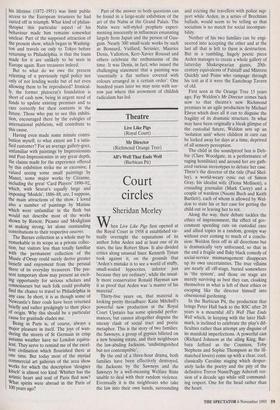Theatre
Live Like Pigs (Royal Court) Mr Director (Richmond Orange Tree) All's Well That Ends Well (Barbican Pit)
Court circles
Sheridan Morley
When Live Like Pigs first opened at the Royal Court in 1958 it established vir- tually overnight the reputations of its author John Arden and at least one of its stars, the late Robert Shaw. It also divided critics along unusual lines: Kenneth Tynan took against it, on the grounds that 'Arden's mistake is to see a world of stuffy, small-souled hypocrites, inferior just because they are ordinary', while the usual- ly more conservative Ronald Hayman saw it as proof that Arden was 'a master of his material'.
Thirty-five years on, that material is looking pretty threadbare: Katie Mitchell's powerful new production at the Royal Court Upstairs has some splendid perfor- mances, but cannot altogether disguise the uneasy clash of social tract and poetic metaphor. This is the story of two families: the Sawneys, a group of gypsies billeted on a new housing estate, and their neighbours the law-abiding Jacicsons, 'undistinguished but not contemptible'.
By the end of a three-hour drama, both families have been effectively destroyed, the Jacksons by the Sawneys and the Sawneys by a well-meaning Welfare State unable to deal with their random violence. Eventually it is the neighbours who take the law into their own hands, surrounding and evicting the travellers with police sup- port while Arden, in a series of Brechtian ballads, would seem to be telling us that socialism is no match for social incompati- bility.
Neither of his two families can be engi- neered into accepting the other and at the last all that is left to them is destruction. But in a rambling, hugely poetic piece Arden manages to create a whole gallery of latterday Shakespearian giants, 20th- century equivalents of Falstaff and Mistress Quickly and Poins who rampage through his text as if it were the Eastcheap Tavern of old.
First seen at the Orange Tree 15 years ago, Fay Weldon's Mr Director comes back now to that theatre's new Richmond premises in an agile production by Michael Elwyn which does all it can to disguise the fragility of its dramatic structure. In what may have been originally a bleak glimpse of the custodial future, Weldon sets up an 'isolation unit' where children in care can be locked away for days at a time, deprived of all sensory perception.
The child in the soundproof box is Deb- bie (Clare Woodgate, in a performance of raging hostilities) and around her are gath- ered various stereotypes to debate her case. There's the director of the title (Paul Shel- ley), a world-weary cynic out of Simon Gray, his idealist wife (Fiona Mollison), a crusading journalist (Mark Carey) and a couple of wardens (Naomi Buch and Keith Bartlett), each of whom is allowed by Wel- don to state his or her case for getting the child out or leaving her to rot.
Along the way, their debate tackles the ethics of imprisonment, the effect of gov- ernment spending cuts on custodial care and allied topics in a random, gossipy way without ever coming to much of a conclu- sion: Weldon fires off in all directions but is dramatically very unfocused, so that in the end a fragile and flaky black comedy of social-service mismanagement disappears up its own uncertainties. The true villains are nearly all off-stage, buried somewhere in the system', and those on stage are merely surviving as best they can, cloaking themselves in what is left of their ethics or escaping like the director himself into obsessional gardening.
In the Barbican Pit, the production that brings Peter Hall back to the RSC after 20 years is a mournful All's Well That Ends Well which, in keeping with the later Hall- mark, is inclined to celebrate the play's dif- ficulties rather than attempt any disguise of its manifold imperfections. A powerful cast (Richard Johnson as the ailing King, Bar- bara Jefford as the Countess, Toby Stephens and Sophie Thompson as the ill- matched lovers) come up with a clear, cool, classically Caroline staging which desper- ately lacks the poetry and the pity of the definitive Trevor Nunn/Peggy Ashcroft ver- sion of a decade ago while still command- ing respect. One for the head rather than the heart.










































































 Previous page
Previous page